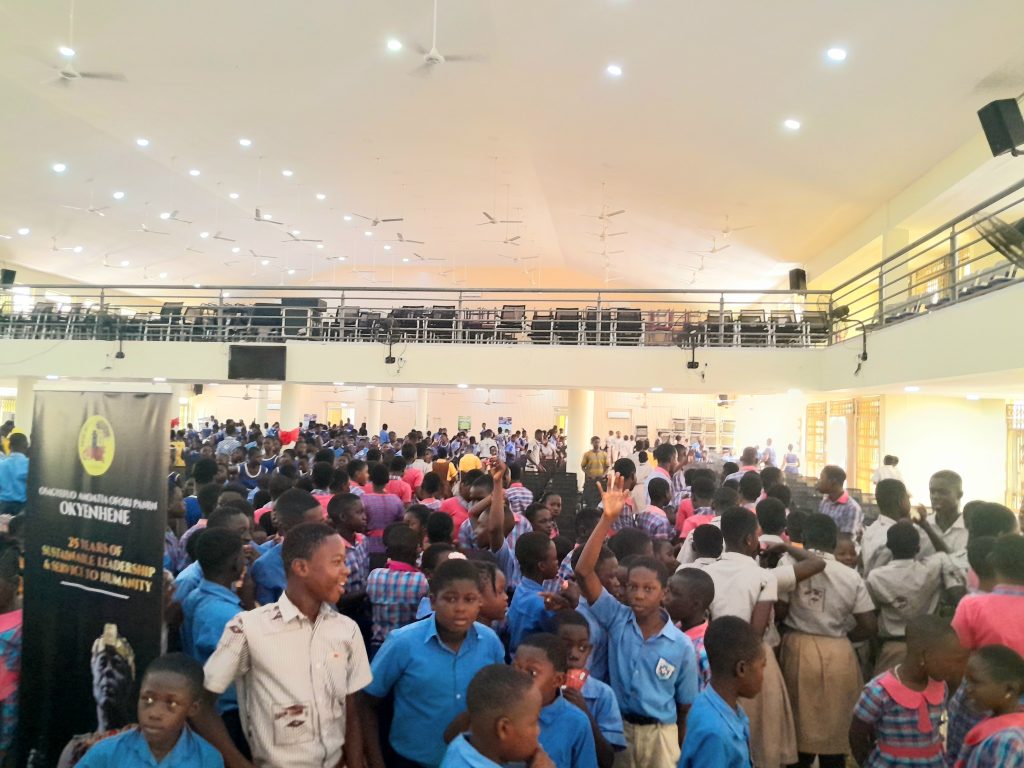By Kamal Ahmed
Kibi(E/R), June 20, GNA – The Okyeman Environment Foundation, in partnership with the Ghana Education Service (GES), has launched leopard clubs in basic schools in the Kibi area of the Abuakwa South Municipality to empower the next generation of environmental stewards.
The school-based clubs would be a platform to educate school pupils in the Akyem Abuakwa traditional territory about the importance of environmental conservation.
The programme was on the theme; “Empowering Young Minds on Environmental Conservation for a Sustainable Future.”
Participating schools included Kibi Demonstration School, Kibi School for the Deaf, Pano Presby, Kibi Anglican School, Kibi Star Primary School, and Rock of Ages School.
In an interview with the Ghana News Agency, the Steering Committee Chairman of the Okyeman Environment Foundation and Asomkahene of Okyehene, Bariman Nana Freduah Agyeman Okotomine, expressed the commitment of Osagyefuo Amoatia Ofori Panin, the Akyem Abuakwa Paramount Chief, in conserving the environment.
He said the chief has a keen interest in ensuring that educated young people of today grow up to protect the environment and its vegetation cover for sustainable livelihoods and development.
He remarked that children were being educated now so that when they grow up, they would possess knowledge and thoughts about the importance of protecting the diminishing forest cover and vegetation.
This is because they would have already been taught about the hazards that arise when the ecosystem is degraded.
“We haven’t reached the goal of 21 years since Okyehene Nana Amoatia Ofori Panyin gave us the task of protecting the environment, which is why we’re here today to empower these children to become environmental protection agents,” he said
He stated that to encourage the next generation to assume responsibility for preventing environmental degradation, Leopard clubs would be expanded to schools across all Akyems in Abuakwa and throughout Ghana.
He noted that achieving this goal would require significant effort from teachers, coordinators, environmental specialists, and partners, stressing that a lot of work needs to be done.
Mr Godfred Ofoe Ceasar, Eastern Regional School Health Education Programme (SHEP) Coordinator, who presided as the guest of honour stated that over the past decade, communities in the Akyem Abuakwa area have faced severe environmental degradation.
He blamed this phenomenon on illegal mining activities, reckless tree felling, and poor agricultural practices.
He noted that these issues have led to a rapid decline in the sustainable and economic benefits gained from the resources that sustain livelihoods.
He pointed out that promoting reforestation and environmental sustainability was a better environmentally friendly way to educate primary school students about environmental issues.

“It has been shown that students in schools would play a more active role in environmental preservation and continue to be change agents for a longer amount of time than adults,” he said.
He added that the clubs would be a vehicle that allowed students to actively participate in choosing and implementing health-related issues while they are in school and that this allowed students to become ‘Agents of Change’.
As change agents, he said they would be required to carry healthy habits and information from school to home and put them into action, influencing their siblings, parents, and friends who are not in school.
He encouraged all stakeholders, particularly those in health and education, to continue to support club members, noting that it is a long-term plan to disseminate knowledge, education, and communication to community members.
Ms. Akosua Kwakye, the World Health Organization’s nutrition officer, told the Ghana News Agency that schools and young people were crucial change agents and could be effective advocates for environmental and human health protection.
“On the global stage, we are already seeing students and young people mobilise to demand long-term action from their governments at all levels to address the critical climate catastrophe,” she said.
She stated that this example served as an inspiring model and presented a valuable opportunity to harness the influential role of schools in combating forest destruction, illegal mining activities (galamsey), and environmental degradation.
She noted that by engaging students and leveraging educational platforms, “we can foster awareness, instil values of environmental stewardship, and empower the younger generation to be agents of positive change in preserving our natural resources and protecting our ecosystems.”
Adding, “School provides a unique context for preventative interventions, and the several years spent in school are a crucial opportunity to create healthy and sustainable behaviours that can contribute to a lifetime of activism to protect the environment and improve health.”
GNA